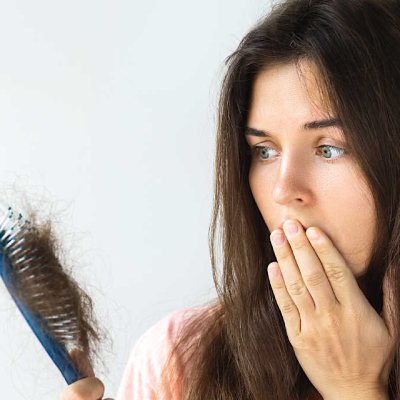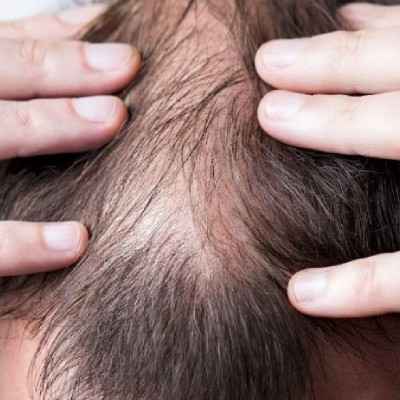Hair Shedding After Surgery Explained by Hair Surgeons

31 August 2022

drgarg

As has been established by medical research, hair loss increases following surgery. You might be concerned if you see a lot of hair loss, but there is no need to be alarmed. Telogen effluvium, a typical yet frequent side effect, causes hair loss after surgery. Your hair should start growing again in a few months, as this is your body's response to having a surgical procedure.
As has been established by medical research, hair loss increases following surgery. You might be concerned if you see a lot of hair loss, but there is no need to be alarmed. Telogen effluvium, a typical yet frequent side effect, causes hair loss after surgery. Your hair should start growing again in a few months, as this is your body's response to having a surgical procedure.
Surgery can be physically traumatic. You can become anxious and lose hair as a result. Here, we go through all the factors contributing to post-surgical hair loss and whether they can be dealt with effectively.
Why Does Hair Shed After Surgery?
You can lose hair after practically any major surgery. The good part is that it's only temporary, and you can grow the hair back in a few months. However, if the procedure affects the hair follicles, that becomes an exception. By using non-surgical methods, destroyed hair follicles will never regenerate again. Only hair transplantation will be able to fix it.
Temporary hair loss or telogen effluvium can result from surgery. The body is under a great deal of stress after surgery. It could disrupt the cycle of hair growth and result in hair loss or hair thinning.
The main cause of such hair loss is stress and nutritional deficits. The stress hormone may directly impact the telogen phase of the hair cycle. Vital nutrients are consumed more frequently to aid in the healing of wounds. As a result of this process, the hair's supply of vitamins and minerals is reduced, which causes hair loss.
People who have undergone surgery frequently experience hair loss. Hair loss stops after the issues are resolved, all the wounds are healed, and the person has completely recovered.
What Happens to The Body During Surgery?
Though there is no definitive evidence, many from the medical fraternity believe there might be a connection between anaesthesia and hair loss. If so, it's more likely to happen after lengthy aesthetics sessions that continue for several hours instead of immediately after shorter operations. Hair loss is caused by myriad factors, including various disorders and thousands of different medications. A small body of data suggests that because anaesthesia can slow down cell division, fast-dividing cells like hair follicles are driven into their resting phase. The good thing is that the hair follicles will soon return to their typical irregular hair growth pattern, which is temporary.Understanding Hair Growth Cycle

- Anagen: Growth Phase The first stage, i.e., the anagen phase of hair development. The hair on your head goes through this phase for three to five years, yet for some people, a single hair may continue to grow for seven or more years. Fortunately, different hair types have different anagen phases. For instance, the anagen phase of brow hairs is significantly shorter than that of scalp hairs. Your hair follicles release hairs during the anagen phase that will keep growing until they are trimmed or until they reach the end of their life cycle and fall out. Approximately 90% of the hairs on your head are in the anagen phase at any given time.
- Catagen: Transitional Phase When the anagen phase concludes, the catagen phase begins and typically lasts ten days or so. Hair follicles contract and hair development slows down during this phase. The hair also breaks off from the base of the hair follicle, but it hangs on for a few more days as it grows. On average, just 5% of the hairs on your head are ever in the catagen phase.
- Telogen: Resting Phase Normally, the telogen period lasts three months. Approximately 10 to 15 percent of the hairs on your scalp are in this stage. During the telogen phase, hairs do not often develop or fall out. New hairs begin to form during the telogen phase in follicles that have recently released hairs during the catagen phase. Although many scientists have separated this stage into the telogen and exogen stages, some health professionals still refer to the telogen phase as the shedding phase.
- Exogen: Shedding Phase The exogen phase of hair growth is simply an extension of or a component of the telogen stage. Hair sheds off the scalp during the exogen phase, frequently aided by washing and combing. Losing 50-100 hairs each day is typical during the exogen period. During the exogen phase, old hairs fall out, lasting between 2 and 5 months, and new hairs form in the follicles.
How To Reverse Hair Loss After Surgery
You can stop hair loss after surgery by addressing the trigger factors, such as stress, dietary deficiencies, and hormonal imbalances. Therefore, lifestyle adjustments, including adopting a healthy diet and consistent hair care routine, will help you regain your lost hair in 3-6 months. If the hair loss continues or gets worse, speak with a trichologist. It can be a sign of serious illness. Here are some additional pointers for controlling hair loss following major surgery.
- Get Sufficient Sleep A surgical operation requires recovery time. Sleep is when the body heals, rebuilds, and gets better. So, to hasten your recovery, make sure you get enough sleep. Lack of sleep will increase stress and perhaps accelerate hair loss.
- Less Stress Try to avoid stress and events that could trigger an anxious response. Self-care methods like yoga and meditation are great for the mind, body, and soul. It will guarantee a quick recovery. Once your start recovering from surgery, your hair begins to grow normally.
- Adopt a Healthy Diet Since protein makes up for the majority of the structure of your hair, eat a diet high in protein. Foods like eggs, lean meat, seafood, green vegetables, and lentils can replenish the required amino acids for hair development. Make sure your food is filled with vitamins, iron, and zinc. To combat the majority of nutritional deficits, whole grains, fruits, nuts, and seeds are excellent choices.
- Keep Scalp Stress To A Minimum Hair follicle stress from tight hairstyles might result in hair loss or a receded hairline. Stay away from hairstyles like tight ponytails and braids.
If these tips don't fix the hair loss issues, it's better to consult a hair doctor or an expert to get a hair loss treatment. You can schedule a visit to the AHS Clinic to have an advanced hair check done on your scalp and figure out the exact issue. If you’re past the hair fall stage and are looking for suitable baldness treatments and procedures for your hair regrowth, fix an appointment with one of our hair experts.
Conclusion
There are many ways to promote hair growth, like following the tips mentioned above or consulting a trichologist to know if hair growth surgery is the way forward for you. Following surgery, hair loss is common and should be treated patiently. It takes roughly three months to regrow hair.
Above all, if hair does not begin to grow again after three months, you must speak with an expert. Please book an appointment with our skilled experts to solve all your hair problems. At the AHS Clinic, we help your confidence back with a head full of hair!
Stay Updated
Subscribe to our email newsletter for helpful tips and valuable resourses
Be an influencer
Join forces with Advanced Hair Studio! Explore exciting collaboration opportunities tailored for influencers. Let's redefine haircare together.
Connect now












